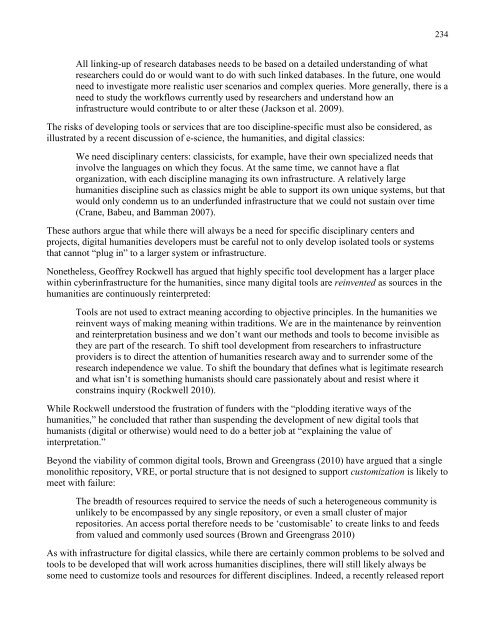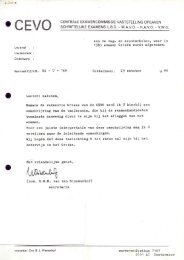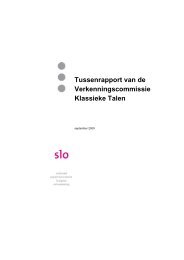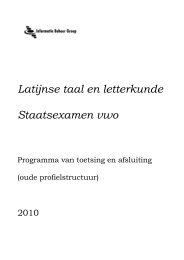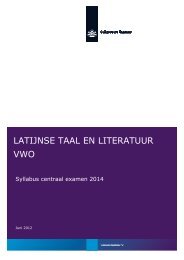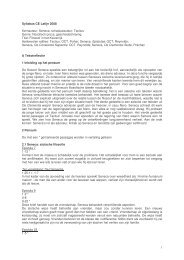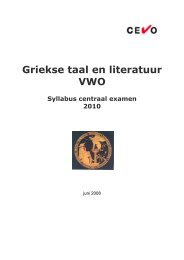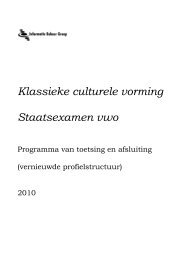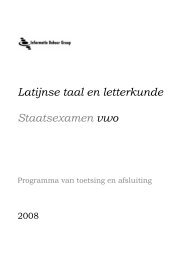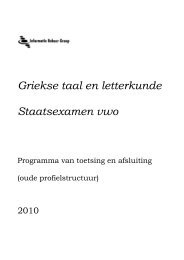Rome Wasn't Digitized in a Day - Council on Library and Information ...
Rome Wasn't Digitized in a Day - Council on Library and Information ...
Rome Wasn't Digitized in a Day - Council on Library and Information ...
Create successful ePaper yourself
Turn your PDF publications into a flip-book with our unique Google optimized e-Paper software.
234<br />
All l<str<strong>on</strong>g>in</str<strong>on</strong>g>k<str<strong>on</strong>g>in</str<strong>on</strong>g>g-up of research databases needs to be based <strong>on</strong> a detailed underst<strong>and</strong><str<strong>on</strong>g>in</str<strong>on</strong>g>g of what<br />
researchers could do or would want to do with such l<str<strong>on</strong>g>in</str<strong>on</strong>g>ked databases. In the future, <strong>on</strong>e would<br />
need to <str<strong>on</strong>g>in</str<strong>on</strong>g>vestigate more realistic user scenarios <strong>and</strong> complex queries. More generally, there is a<br />
need to study the workflows currently used by researchers <strong>and</strong> underst<strong>and</strong> how an<br />
<str<strong>on</strong>g>in</str<strong>on</strong>g>frastructure would c<strong>on</strong>tribute to or alter these (Jacks<strong>on</strong> et al. 2009).<br />
The risks of develop<str<strong>on</strong>g>in</str<strong>on</strong>g>g tools or services that are too discipl<str<strong>on</strong>g>in</str<strong>on</strong>g>e-specific must also be c<strong>on</strong>sidered, as<br />
illustrated by a recent discussi<strong>on</strong> of e-science, the humanities, <strong>and</strong> digital classics:<br />
We need discipl<str<strong>on</strong>g>in</str<strong>on</strong>g>ary centers: classicists, for example, have their own specialized needs that<br />
<str<strong>on</strong>g>in</str<strong>on</strong>g>volve the languages <strong>on</strong> which they focus. At the same time, we cannot have a flat<br />
organizati<strong>on</strong>, with each discipl<str<strong>on</strong>g>in</str<strong>on</strong>g>e manag<str<strong>on</strong>g>in</str<strong>on</strong>g>g its own <str<strong>on</strong>g>in</str<strong>on</strong>g>frastructure. A relatively large<br />
humanities discipl<str<strong>on</strong>g>in</str<strong>on</strong>g>e such as classics might be able to support its own unique systems, but that<br />
would <strong>on</strong>ly c<strong>on</strong>demn us to an underfunded <str<strong>on</strong>g>in</str<strong>on</strong>g>frastructure that we could not susta<str<strong>on</strong>g>in</str<strong>on</strong>g> over time<br />
(Crane, Babeu, <strong>and</strong> Bamman 2007).<br />
These authors argue that while there will always be a need for specific discipl<str<strong>on</strong>g>in</str<strong>on</strong>g>ary centers <strong>and</strong><br />
projects, digital humanities developers must be careful not to <strong>on</strong>ly develop isolated tools or systems<br />
that cannot “plug <str<strong>on</strong>g>in</str<strong>on</strong>g>” to a larger system or <str<strong>on</strong>g>in</str<strong>on</strong>g>frastructure.<br />
N<strong>on</strong>etheless, Geoffrey Rockwell has argued that highly specific tool development has a larger place<br />
with<str<strong>on</strong>g>in</str<strong>on</strong>g> cyber<str<strong>on</strong>g>in</str<strong>on</strong>g>frastructure for the humanities, s<str<strong>on</strong>g>in</str<strong>on</strong>g>ce many digital tools are re<str<strong>on</strong>g>in</str<strong>on</strong>g>vented as sources <str<strong>on</strong>g>in</str<strong>on</strong>g> the<br />
humanities are c<strong>on</strong>t<str<strong>on</strong>g>in</str<strong>on</strong>g>uously re<str<strong>on</strong>g>in</str<strong>on</strong>g>terpreted:<br />
Tools are not used to extract mean<str<strong>on</strong>g>in</str<strong>on</strong>g>g accord<str<strong>on</strong>g>in</str<strong>on</strong>g>g to objective pr<str<strong>on</strong>g>in</str<strong>on</strong>g>ciples. In the humanities we<br />
re<str<strong>on</strong>g>in</str<strong>on</strong>g>vent ways of mak<str<strong>on</strong>g>in</str<strong>on</strong>g>g mean<str<strong>on</strong>g>in</str<strong>on</strong>g>g with<str<strong>on</strong>g>in</str<strong>on</strong>g> traditi<strong>on</strong>s. We are <str<strong>on</strong>g>in</str<strong>on</strong>g> the ma<str<strong>on</strong>g>in</str<strong>on</strong>g>tenance by re<str<strong>on</strong>g>in</str<strong>on</strong>g>venti<strong>on</strong><br />
<strong>and</strong> re<str<strong>on</strong>g>in</str<strong>on</strong>g>terpretati<strong>on</strong> bus<str<strong>on</strong>g>in</str<strong>on</strong>g>ess <strong>and</strong> we d<strong>on</strong>’t want our methods <strong>and</strong> tools to become <str<strong>on</strong>g>in</str<strong>on</strong>g>visible as<br />
they are part of the research. To shift tool development from researchers to <str<strong>on</strong>g>in</str<strong>on</strong>g>frastructure<br />
providers is to direct the attenti<strong>on</strong> of humanities research away <strong>and</strong> to surrender some of the<br />
research <str<strong>on</strong>g>in</str<strong>on</strong>g>dependence we value. To shift the boundary that def<str<strong>on</strong>g>in</str<strong>on</strong>g>es what is legitimate research<br />
<strong>and</strong> what isn’t is someth<str<strong>on</strong>g>in</str<strong>on</strong>g>g humanists should care passi<strong>on</strong>ately about <strong>and</strong> resist where it<br />
c<strong>on</strong>stra<str<strong>on</strong>g>in</str<strong>on</strong>g>s <str<strong>on</strong>g>in</str<strong>on</strong>g>quiry (Rockwell 2010).<br />
While Rockwell understood the frustrati<strong>on</strong> of funders with the “plodd<str<strong>on</strong>g>in</str<strong>on</strong>g>g iterative ways of the<br />
humanities,” he c<strong>on</strong>cluded that rather than suspend<str<strong>on</strong>g>in</str<strong>on</strong>g>g the development of new digital tools that<br />
humanists (digital or otherwise) would need to do a better job at “expla<str<strong>on</strong>g>in</str<strong>on</strong>g><str<strong>on</strong>g>in</str<strong>on</strong>g>g the value of<br />
<str<strong>on</strong>g>in</str<strong>on</strong>g>terpretati<strong>on</strong>.”<br />
Bey<strong>on</strong>d the viability of comm<strong>on</strong> digital tools, Brown <strong>and</strong> Greengrass (2010) have argued that a s<str<strong>on</strong>g>in</str<strong>on</strong>g>gle<br />
m<strong>on</strong>olithic repository, VRE, or portal structure that is not designed to support customizati<strong>on</strong> is likely to<br />
meet with failure:<br />
The breadth of resources required to service the needs of such a heterogeneous community is<br />
unlikely to be encompassed by any s<str<strong>on</strong>g>in</str<strong>on</strong>g>gle repository, or even a small cluster of major<br />
repositories. An access portal therefore needs to be ‘customisable’ to create l<str<strong>on</strong>g>in</str<strong>on</strong>g>ks to <strong>and</strong> feeds<br />
from valued <strong>and</strong> comm<strong>on</strong>ly used sources (Brown <strong>and</strong> Greengrass 2010)<br />
As with <str<strong>on</strong>g>in</str<strong>on</strong>g>frastructure for digital classics, while there are certa<str<strong>on</strong>g>in</str<strong>on</strong>g>ly comm<strong>on</strong> problems to be solved <strong>and</strong><br />
tools to be developed that will work across humanities discipl<str<strong>on</strong>g>in</str<strong>on</strong>g>es, there will still likely always be<br />
some need to customize tools <strong>and</strong> resources for different discipl<str<strong>on</strong>g>in</str<strong>on</strong>g>es. Indeed, a recently released report


